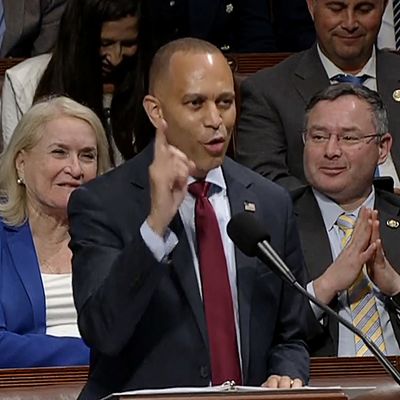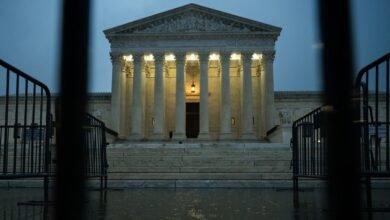

Hakeem Jeffries with another point or ten.
Photo: House TV/Reuters
When top House Democrat Hakeem Jeffries chose to exploit a loophole in the House rules, which allows party leaders to talk as long as they want, to discuss at record length the baleful effects of Donald Trump’s One Big Beautiful Bill, it initially looked like a bit of a publicity stunt, albeit it a good one. It delayed for hours a very big moment of Republican self-congratulation over the final passage of this enormous package of legislation. It probably screwed up a lot of congressional flight arrangements to get members home for Independence Day. And it likely put a few kinks into plans for Trump’s own festive July 4 signing ceremony, wherein the president will surely praise himself, thank his vassals, and tell more than a few fibs about what his grim masterpiece will do.
But beyond all that, it’s becoming clear that Democrats need to do a much better job articulating their take on this bill and its profoundly reactionary effects on the social safety net. To those of us whose job it is to listen to arguments over 940-page bills as they chug through Congress for months, it may seem like congressional Democrats have been grinding away at the message that Republicans are cutting Medicaid to give a tax cut to billionaires. Some of them held up signs about Medicaid cuts when Trump delivered his belligerent address to a joint session of Congress four months ago. Yet a startling new poll shows the extent to which that messaging — and for that matter, Republican messages hailing the megabill as a people-pleasing growth engine for the U.S. economy that doesn’t touch Medicaid benefits at all — isn’t really breaking through:
It’s not just that half of the country isn’t paying attention to the news, either, as the poll analysis from Priorities USA notes:
Americans are 4x as likely to have heard about Iran bombings as they are to have heard about Medicaid cuts in the bill. Awareness of the GOP bill is limited, diffuse and general in nature, at best.
And the kind of people Democrats need to reach but often don’t aren’t hearing much at all:
73% of 2024 Trump supporters who didn’t vote in 2020 and 56% of Biden-to-Trump flippers have heard nothing about the bill. These shares are 20 points higher than their Harris supporting counterparts — indicating the urgent opportunity if Democrats break out of our own media silos.
Part of the problem, to be sure, is that Trump’s megabill is incredibly broad and complicated, and the budget reconciliation process by which it was developed, debated, and enacted is insanely complex and obscure. It’s all about as remote from the civics-book understanding of how laws are made as you can get, and it has been understandably difficult for Democrats to describe it compellingly in a sound bite, a protest sign, a TV ad, or indeed, in Jeffries’s eight-hour speech. It was designed that way, and that’s why half the public isn’t absorbing anything about it, and a lot of others are simply processing it via big, vague party-driven narratives.
The bottom line is that the struggle to define this incredibly consequential legislation has just begun. For Democrats, finding ways to convey the horror the megabill inspires in those who have studied it closely, and the concrete damage it will do to actual people, must continue right up until the midterm elections. Yes, Trump and his allies will do many other things that might galvanize voters, from his reckless foreign policies to his cruel mass-deportation initiative to the lawless conduct he exemplifies and encourages among his appointees. But nothing is likely to match the megabill in magnitude or in the malignancy of its authors. If voters march to the polls in 2026 or 2028 with no better than a rough idea of what it means, America will get more of the same.




